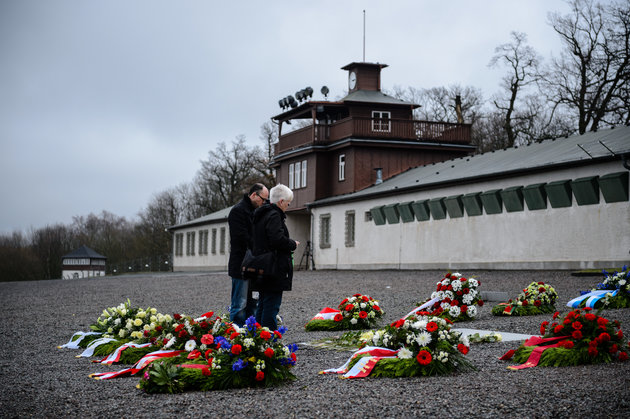Uncomfortable facts that should be addressed – not just on Holocaust Memorial Day but every day

A woman and a man at the memorial plaque at Buchenwald concentration camp near Weimar, Germany [Image: Jens Schlueter/Getty Images].
Today is, I believe, Holocaust Remembrance Day, when the world, or at least the Western world, reflects on the Shoah and the calculated extermination of six million Jews.
As we commemorate the sufferings of the Jews during the Nazi regime, we also need to take on board that it isn’t just about anti-Semitism, but about similar horrors that have disfigured human history down the centuries, and murderous, criminal regimes that are perpetrating them today.
Just so. The Nazi Holocaust, the killing of millions of Jews, and the way in which they were murdered, should never be forgotten. But part of this remembrance must involve recognition that similar hate-motivated atrocities can happen – and are happening – even now.
Unfortunately, there are some highly vocal people who seem to want to mask this fact, as we have seen on This Site over the last few days.
Holocaust Remembrance Day isn’t just about commemorating the Holocaust and its victims, but other genocides and their victims that have occurred throughout history. Hitler partly made his decision to go ahead with the extermination of the Jews because of the complete lack of western reaction to the Young Turks’ massacre of the Armenians. He commented, ‘Who remembers the Armenians?’ And before then, the German colonial authorities in what is now Tanganyika had attempted to exterminate the Herrero after they revolted, using similar eugenicist logic.
It is … important to remember the other victims of the Nazi camps as well.
This included the congenitally disabled, who were murdered by Nazi doctors under the Aktion T4 programme with the assistance and supervision of the SS… This prefigured and prepared for the murder of the Jews, particularly in the use of poison gas.
I made the point that disabled people are being persecuted to their deaths by the Conservative government in the United Kingdom – right now – in a response to comments in Prime Minister’s Questions on Wednesday (January 24).
And what initial response did I receive?
Denial. And denial is one of the ten stages of genocide, as we all know from the Holocaust Memorial Day website. Right?
The Nazis also attempted to exterminate the Romanies – the Gypsies – as they too were considered, like the Jews, to be subhuman and a threat to German society and racial industry.
Other victims of the camps included the mentally ill, neurotics, prostitutes, recidivist criminals, Prisoners of War, and political prisoners, such as trade unionists, Socialists, Communists, Anarchists, gay men, and slave workers from the Slav nations. The last were worked to death in horrific conditions, including building the Nazi fortifications and tunnels in the Channel Islands.
The Holocaust Memorial Day website devotes a couple of paragraphs on a page to these victims of the Nazi Holocaust. The highest estimate of the death figures shows they outnumber Jewish victims by a ratio of nearly two to one.
The website also devotes several pages each to the genocides in Cambodia, Darfur, Bosnia and Rwanda, and mentions the atrocities against Armenians which encouraged Hitler to commit his own.
It omits many other genocides, both recent and historical.
Nothing is said about the indigenous people of America, for example. Those of you who are aware of the HMD website may not even know there is a site for Aztec Natives, which makes the following pertinent point:
“The Mexican people are the descendants and the end product of five centuries of genocide – the greatest Holocaust in human history. Over 100 million of our ancestors, i.e. at least 90% of natives were killed.”
100 million dead, and no commemoration on Holocaust Memorial Day. It seems some groups have stronger public relations people than others.
Genocides have continued to be perpetrated, such as the various crimes against humanity committed by Fascist regimes across Latin America, Asia and Africa, supported by American foreign policy. The persecution of the Rohingya is just the latest of these.
Isn’t it interesting how we can identify the wrongdoings of people in other countries, yet we say nothing about what’s happening in our own? “It couldn’t happen here”, as the saying goes.
It has; it does; it is.
Those who deny it are complicit.
Fortunately, the Beastrabban piece provides a ray of hope. We see that not everybody supports the overwhelming concentration of attention on the Nazi Holocaust, and it is important to note that Jewish scholars are among those leading the way in this regard.
And Jews have been involved in protesting and commemorating them and their victims as well. In Canada, the leader of the mainstream Jewish organisation, Bernie Farber, organised a ‘Shabbat for Darfur’ after that city was attacked by the Islamist Janjaweed Militia in the early part of this century. Farber’s generous action has been bitterly criticised by members of the transatlantic conservative Right, who feel that Jews should concentrate solely on their own sufferings in the Holocaust, and not expand their experience of suffering, persecution and attempted genocide to form solidarity with the other persecuted ethnic and religious groups.
Why not form solidarity with other persecuted groups? We all know there is strength in numbers. Is it because making such connections might reveal uncomfortable truths about events closer to home?
Israeli scholars have also noted that the Holocaust, while horrific, was not a unique event. See Genocide: A Critical Bibliographic Review, edited by Israel W. Charny, the executive director of the Institute on the Holocaust, Jerusalem, and Director of Postgraduate Interdisplinary and Graduate Social Work Programs in Family, Therapy, Bob Shapell School of Social Work, Tel Aviv University. Dr. Charny’s book also includes a chapter on the ethnic cleansing of Israel’s indigenous Arab population, which is definitely unwelcome to the Likudniks.
But it bears out Ilan Pappe’s assertion that Israelis are still decent people, who need to have the situation and issues properly explained to them. But odiously, Netanyahu, Likud and other ethno-nationalists in his ruling coalition are doing all they can to prevent that occurring. As are his little helpers over here in the shape of the Jewish Labour Movement and the Campaign Against Anti-Semitism.
Food for thought, I hope. But I wonder if critics of This Site and This Writer will be able to forgive me for including more groups in my own commemoration of Holocaust Memorial Day than they do.
Source: Wishing Everyone a Solemn and Reflective Holocaust Remembrance Day | Beastrabban\’s Weblog
Vox Political needs your help!
If you want to support this site
(but don’t want to give your money to advertisers)
you can make a one-off donation here:
Here are four ways to be sure you’re among the first to know what’s going on.
1) Register with us by clicking on ‘Subscribe’ (in the left margin). You can then receive notifications of every new article that is posted here.
2) Follow VP on Twitter @VoxPolitical
3) Like the Facebook page at https://www.facebook.com/VoxPolitical/
Join the Vox Political Facebook page.
4) You could even make Vox Political your homepage at http://voxpoliticalonline.com
And do share with your family and friends – so they don’t miss out!
If you have appreciated this article, don’t forget to share it using the buttons at the bottom of this page. Politics is about everybody – so let’s try to get everybody involved!
Buy Vox Political books so we can continue
fighting for the facts.
The Livingstone Presumption is now available
in either print or eBook format here:
Health Warning: Government! is now available
in either print or eBook format here:
The first collection, Strong Words and Hard Times,
is still available in either print or eBook format here:










I was thinking the same the other day Why concentrate on one group? They suffered horribly, but others have too. I never understood why their suffering and loss were less important. Why not have an international day to mark all the atrocities and crimes against humanity everywhere? It might motivate us to find solutions to conflicts and try harder to get on with our neighbours.
Thank you. You might like the third post down on my Timeline.
Elephant in the room being the fella on your new plastic fiver.
It was said that Hitler got the idea of Concentration Camps from Churchill.
This Independence article sums it up.
http://alturl.com/st62a
Well it wasn’t it wasn’t Churchil in charge when the UK created concentration camps, but why isn’t there a commemoration for the 1190 slaughter of the Jews in York with anti Semite behaviour?
Nice to see the beast back on the scene Mike.
He has been around, although he’s not able to be as productive as he might like at the moment.
The entire purpose of Holocaust Memorial Day is to remember, educate and inform people to prevent a repetition of the worst (and well documented) genocide in human history.
It is not a Jewish memorial. Jews have their own specific memorial day called Yom Hashoah which this year 2018, falls on 11 April.
The Holocaust Memorial Trust makes this statement of its purpose:
The Holocaust Memorial Day Trust (HMDT) is the charity that promotes and supports Holocaust Memorial Day (HMD). 27 January is the day for everyone to remember the six million Jews murdered in the Holocaust, and the millions of people killed in Nazi Persecution and in subsequent genocides in Cambodia, Rwanda, Bosnia, and Darfur. 27 January marks the liberation of Auschwitz-Birkenau, the largest Nazi death camp.
On HMD we can honour the survivors of these regimes of hatred and challenge ourselves to use the lessons of their experience to inform our lives today.
HMD is a time when we seek to learn the lessons of the past and to recognise that genocide does not just take place on its own, it’s a steady process which can begin if discrimination, racism and hatred are not checked and prevented. We’re fortunate here in the UK; we are not at risk of genocide. However, discrimination has not ended, nor has the use of the language of hatred or exclusion. There is still much to do to create a safer future and HMD is an opportunity to start this process.